|
|
|
Sort Order |
|
|
|
Items / Page
|
|
|
|
|
|
|
| Srl | Item |
| 1 |
ID:
059164
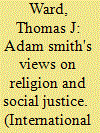

|
|
|
| 2 |
ID:
099673
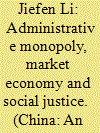

|
|
|
|
|
| Publication |
2010.
|
| Summary/Abstract |
This article attempts to address the problem of administrative monopoly through a case study of the taxi monopoly in Beijing. The case reflects the conflict between building a market economy and working within the constraints of the old institutions, revealing that the biggest obstacle in contemporary China for building a market economy comes from administrative power or government interference with market operation. Only when administrative monopoly is eliminated will anti-monopoly actions against other monopolistic behaviour be justified and meaningful. A management model for resolving the Beijing taxi monopoly is proposed.
|
|
|
|
|
|
|
|
|
|
|
|
|
|
|
|
| 3 |
ID:
173788
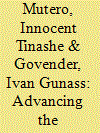

|
|
|
|
|
| Summary/Abstract |
This article frames a discussion on how South African universities and communities can co-create university spaces that facilitate repairing the country’s dented social, economic and political infrastructure through engaged creative-placemaking. The first section further explores the concept followed by a discussion of historical issues which have a material bearing on how universities can and should frame community engagement in South Africa. It pays close attention to how post-apartheid nation building is hindered by the remnants from the past and is dislocated to both the present and the future. The article also brings into question the type and role of leadership, in both universities and communities. The final section of the article presents a framework for engaged creative-placemaking delineating the antecedents that are needed by the key stakeholders, namely, public and private enterprises, university and the community to successfully work together in achieving a just society through creative-placemaking. Improving place liveability through engaged creative-placemaking has the potential to stimulate local economies and leads to cultural diversity, civic engagement and increased innovation.
|
|
|
|
|
|
|
|
|
|
|
|
|
|
|
|
| 4 |
ID:
152606


|
|
|
|
|
| Summary/Abstract |
The very essence of Ambedkar’s vision of social justice was to establish a just, equitable and fair society, where the women, scheduled castes and scheduled tribes would get their due place in the society and for that he did incorporate the provisions in the Indian Constitution so that they would get adequate opportunities so that they could be freed from the then prevalent social evils and ill-practices in the society. As an ardent champion of the cause, he sacrificed his whole life for the amelioration of the conditions of such people in the Indian society. Therefore, he is even hailed today as the messiah of the oppressed and downtrodden.
|
|
|
|
|
|
|
|
|
|
|
|
|
|
|
|
| 5 |
ID:
119963
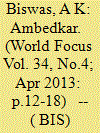

|
|
|
| 6 |
ID:
119977
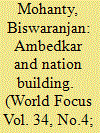

|
|
|
| 7 |
ID:
119976
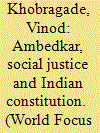

|
|
|
| 8 |
ID:
119965
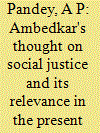

|
|
|
| 9 |
ID:
167511
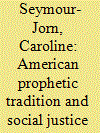

|
|
|
|
|
| Summary/Abstract |
This article responds to recent research calling for more nuanced discussions of Muslim political and social activist subjectivities (Ahmed 2011; Maira 2016; Mansouri et al. 2016; Nagel and Staeheli 2011). We analyze community and social justice activism among Muslims in Milwaukee through the lens of the American prophetic tradition. We argue that Muslim leaders in Milwaukee represent their activism as part of this tradition, and that they draw upon a complex of religious, social and political discourses and social practices. These include American civil rights activism, Islamically inspired social action, and a desire to engage in placemaking that responds to the specific conditions of Milwaukee, a city that features intense racial segregation, dense pockets of poverty, and increased immigration from the Arabo-Islamic world. Thus, we see a pluralization of Muslim social activist subjectivity: social justice activism which is religiously based, related to the civil rights tradition, and which is also highly attuned to the specific ways in which Muslims may practice a politics of belonging in this Midwestern city.
|
|
|
|
|
|
|
|
|
|
|
|
|
|
|
|
| 10 |
ID:
120051
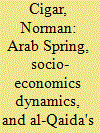

|
|
|
| 11 |
ID:
087564
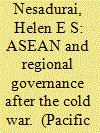

|
|
|
|
|
| Publication |
2009.
|
| Summary/Abstract |
This paper first reviews and critiques the dominant realist and constructivist accounts of ASEAN, which have enjoyed much prominence in The Pacific Review since the journal's founding in 1988. ASEAN behaviour and outcomes cannot be fitted into neat theoretical categories that emphasize either material or ideational variables in explanation. Instead, ASEAN displays complexities in behaviour that are the product of the contingent interaction between the material (power, territory, wealth) and the ideational (norms, ideas, identity) as member states actively seek to manage domestic order as well as regional order within and beyond ASEAN. In all of this, state interests and identities remain paramount, which means that the long-standing ASEAN norms of sovereignty/non-interference remain central to regional governance.
|
|
|
|
|
|
|
|
|
|
|
|
|
|
|
|
| 12 |
ID:
131424
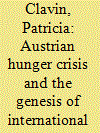

|
|
|
|
|
| Publication |
2014.
|
| Summary/Abstract |
From its foundation in 1918, the new Austrian republic was gripped by famine and a crisis of confidence in its currency that threatened to tip the new state into hyperinflation and revolution. This article shows how western efforts to aid Austria combat famine and its financial crisis were linked, and how they had a profound impact on the new League of Nations, the world's first multi-purpose intergovernmental organization. It also demonstrates the importance of the incipient wartime international bureaucracy for League agency. Contrary to the expectations of its architects, member governments, international financiers, businessmen and economists began to see the League as a useful tool to meet common needs that today would be called the search for human security. The article demonstrates how the Austrian food and financial crisis was the founding moment in the institutionalization of international economic and financial coordination, cooperation and oversight. It established the Economic and Financial Organization of the League of Nations, whose work would later inform its successors, the International Monetary Fund, the World Bank and the European Union. The study speaks to the ways in which the notion of security has broadened in the past two decades to embrace economic, social, political and environmental concerns. But the notion of 'human security' is not new; it was written into the body of the League.
|
|
|
|
|
|
|
|
|
|
|
|
|
|
|
|
| 13 |
ID:
130027
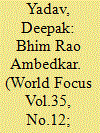

|
|
|
|
|
| Publication |
2014.
|
| Summary/Abstract |
Dr Ambedkar's legacy as a socio-political reformer had a deep effect on modern India. He believed that "political democracy without social democracy and economic justice is meaningless." In post-Independence India his socio-political thought has acquired respect across the political spectrum. His initiatives have influenced various spheres of life and transformed the way India today looks at socio-economic policies, education and affirmative action through socio-economic and legal incentives. His reputation as a scholar led to his appointment as free India's first law minister, and chairman of the committee responsible to draft a constitution. He passionately believed in the freedom of the individual and criticized equally both orthodox casteist Hindu society.
|
|
|
|
|
|
|
|
|
|
|
|
|
|
|
|
| 14 |
ID:
099781
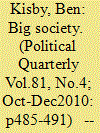

|
|
|
|
|
| Publication |
2010.
|
| Summary/Abstract |
The Prime Minister, David Cameron, recently set out his vision of a 'big society'. Its core themes are empowering communities, redistributing power from the state to citizens and promoting a culture of volunteering. The idea is badly flawed. It overlooks the crucial role that needs to be played by the state in promoting social justice, which is vital to the development of active citizenship and vibrant communities. Moreover, Cameron views the active citizen as simply a philanthropist and volunteer rather than as a politically literate individual, knowledgeable about the major political issues of the day and actively involved in debates about how public or private services ought to be run. The initiative is particularly perverse in the context of the credit crunch, a vitally important cause of which was precisely not the development of an over-mighty state but rather the inadequate state regulation of free market trading activities by banks.
|
|
|
|
|
|
|
|
|
|
|
|
|
|
|
|
| 15 |
ID:
147382
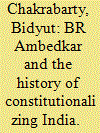

|
|
|
|
|
| Summary/Abstract |
BR Ambedkar is usually projected as a protagonist of social justice. But equally important was his role in constitutionalizing India, evident first in his witness to the 1919 Southborough Committee on Franchise, followed by his intervention in the 1930 Round Table Conference in London, where he defended compensatory discrimination for the untouchables in opposition to the Gandhi. The article argues that in so doing Ambedkar was evidently influenced by his teacher at the University of Columbia, John Dewey, who taught him the finer principles of liberalism. By comparing the views of Gandhi and Ambedkar on separate electorates and reservation, the article pursues the argument that unlike the former, Babasaheb sought to transform society through politics which, to him, meant the consolidation of constitutional values or endosmosis, or, to borrow George Grote’s expression, constitutional morality. On the basis of a thorough analysis of the principal arguments that he made to defend constitutional protection for compensatory discrimination, this article provides valuable insights showing the analytical basis of Babasaheb’s notion of social justice. Furthermore, his defence of liberal constitutional values also laid the foundation of a unique moral and political framework for public reasoning, a contribution that has not been adequately recognized in contemporary scholarship on Dalits, BR Ambedkar or social discrimination.
|
|
|
|
|
|
|
|
|
|
|
|
|
|
|
|
| 16 |
ID:
083690
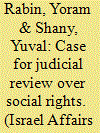

|
|
|
| 17 |
ID:
127576
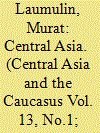

|
|
|
|
|
| Publication |
2012.
|
| Summary/Abstract |
In Central Asia, religion is gradually coming to the fore in everyday life as a fairly integrated phenomenon with a wide range of functions: consolidation of ethnic self-awareness, shaping spiritual and moral culture together with the awareness of being part of a religious and the world community; fulfilling social functions through religious prescriptions; formulating the ideals of social justice, as well as man's duty to the state and the state's to man, etc.
Some of the functions, however, are internally contradictory: consolidation of the religious community does not always bring society together. In other words, in some cases religion might exacerbate the relations between the state and the religious part of society.
Religious consolidation not infrequently revives old problems and breeds disagreements inside society; conscientious believers often make too rigid demands of the state (which turns them into the opposition), while any encroachments on the religious principle of fairness may stir up protest feelings.
|
|
|
|
|
|
|
|
|
|
|
|
|
|
|
|
| 18 |
ID:
128481
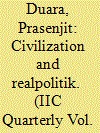

|
|
|
| 19 |
ID:
162616
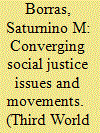

|
|
|
|
|
| Summary/Abstract |
We argue that the multiple contemporary converging crises have significantly altered the context for and object of political contestations around agrarian, climate, environmental and food justice issues. These shifts affect alliances, collaboration and conflict among and between state and social forces, as well as within and between movements and societies. The actual implications and mechanisms by which these changes are happening are empirical questions that need careful investigation. The bulk of our discussion is dedicated to the issue of responses to the crises both by capitalist forces and those adversely affected by the crises, and the implications of these for academic research and political activist work. More specifically, we explore four thematic clusters, namely (1) class and intersectionality; (2) sectoral and multisectoral issues and concerns; (3) importance of immediate, tactical and concrete issues of working people; and (4) links between national and global institutional spaces and political processes. We know only a little about the questions we framed here, but it is just enough to give us the confidence to argue that these questions are areas of inquiry that deserve closer attention in terms of both academic research and political debates and actions.
|
|
|
|
|
|
|
|
|
|
|
|
|
|
|
|
| 20 |
ID:
143641
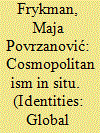

|
|
|
|
|
| Summary/Abstract |
This article explores an in situ approach to the emergence of cosmopolitanism as domains of common interest and aspiration. Adopting a cosmopolitan lens that does not assume the central role of categories of diversity in structuring social relationships, the article captures the dialectics between the material place, which facilitates interactions and the social space created in the course of engaged practice in a specific urban setting. The cosmopolitan lens made visible the ways in which local and global concerns and dynamics of power are emplaced in Möllevången, in Malmö, Sweden, a neighbourhood defined by a local history of immigration and activism as well as by the globe-spanning processes of urban restructuring. Locally organised cultural and political events and initiatives promote a sense of belonging to the neighbourhood and conjoin particular and universal commitments towards environmental issues, human rights, equality and social justice.
|
|
|
|
|
|
|
|
|
|
|
|
|
|
|
|
|
|
|
|
|